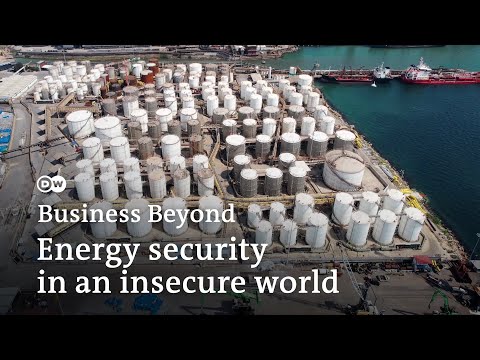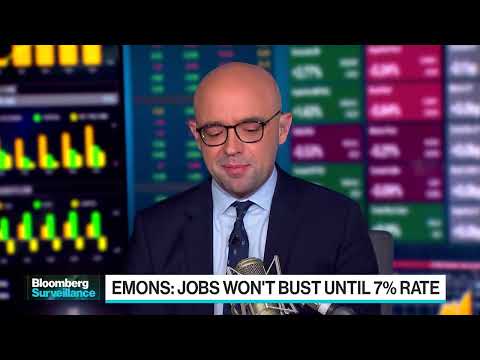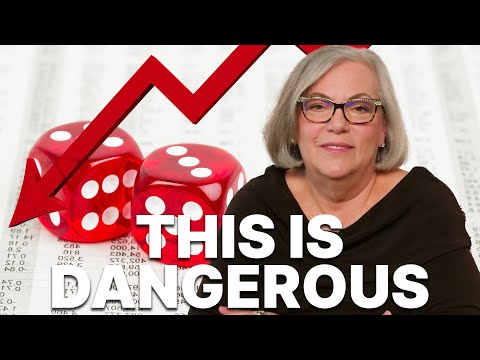Energy security in an insecure world | Business Beyond

It’s literally the fuel of the global economy. Energy comes in many forms and has countless uses. Making sure a country has enough of it is a critical priority for any government. 2022 has been a year of crisis in the global energy sector. The after-effects of the pandemic were compounded by Russia’s war in Ukraine. Markets were upended, prices have skyrocketed
and old assumptions have been shattered. These are really major developments that would define 2022 as an important era or landmark in the history of energy markets. As the world reels from price and supply shocks, energy security has become a major concern.
I would say whether it's Pakistan, Bangladesh, Sri Lanka, all of these countries are in dire straits because of the energy. And as Europe has rushed to secure its own supplies, others have been left in the cold. They're facing real challenges and questions over how much they pay, how much they can afford to pay, and how that affects the domestic supply and the lives of people in those countries.
In this video, we’ll ask if energy security could become a casualty of rising geopolitical tension. I really see energy as one of the few remaining bridges between the United States and China If the chaos of recent times has disrupted the world’s transition towards renewable energy. There is no doubt that we are going towards a new energy system. No one can stop this process. Or if the world can emerge from this moment with a more secure, resilient energy system. There has been a bigger focus on the nexus of energy security and climate because you cannot be energy secure without addressing climate change, without decarbonizing That’s all coming up on Business Beyond. 2022 is still not over, yet it’s already clear this has been the year when global energy markets reached breaking point. It has just exacerbated what was already
becoming pretty critical in the energy markets because of Covid 19 Pandemic, where you saw consumption and demand for energy plummeting to very, very low levels because of the lockdowns And then, just as the effects of the pandemic began to abate, Russia invaded Ukraine. Overnight, the world had changed. For energy markets, that change appears to be permanent. There is no going back to huge reliance on Russian energy sources. There is no going back to pre-February 24th. So we're talking about, in one sense, in the way some of how some of the global routes have shifted. Yes, it's absolutely a turning point, in a sense of how we're
understanding geopolitics and energy and kind of seeing those two just completely intertwined. Russia has really made very clear that it is not willing to respect basic international norms of respect for borders and that it is willing to use energy as a weapon against its primary customers and its closest neighbours and that there's really no going back from this. And so the big change then to the market is with Europe renouncing Russian oil and decreasing Russian gas and soon renouncing Russian products. That has led to a major
restructuring of both global oil and gas markets. At the end of 2021, Russia was the EU's main supplier of energy. It accounted for one third of the EU's oil imports and just under half of all the natural gas that came into the bloc. The war led the EU to dramatically cut back the amount it imports. It now plans to be independent of Russian energy by 2030. Cutting out Russian oil and gas has contributed significantly to the upward spiral of energy prices over the last couple of years. According to the IMF’s fuel price index – which measures global prices for crude oil, natural gas and coal – prices globally have increased SIXFOLD since April 2020. Russia’s invasion has pushed prices ever higher.
The International Energy Agency has said that the world is now facing its first truly global energy crisis as a result of the overlapping problems. In a recent report it said: "With unrelenting geopolitical and economic concerns, energy markets remain extremely vulnerable, and the crisis is a reminder of the fragility and unsustainability of the current global energy system.” The heaviest burden is falling on poorer households where a larger share of income is spent on energy The crisis has forced Europe to confront something many believe it had neglected for decades – its long term energy security. But what exactly do we mean when we talk about energy security? For me energy security is the ability of a country to access affordable, reliable, sustainable sources of energy free from coercion. So that's the definition for it. So in that sense the United States is able to access that supply,
though it may be expensive at times without coercion. Europe by contrast is not able to access physical supply without coercion right now from Russia and therefore it's energy insecure. And some countries in Africa are just unable to access energy supply period. And so they are energy insecure for that reason. It has evolved over the last several decades. I think when we start with the basics, energy that is affordable, that's reliable, that's accessible, equitable” Access to reliable, affordable energy is of critical importance to practically every commercial activity on the planet. It is also vital for the provision of some of humanity’s most basic needs such as food, water and heating.
The world gets its energy from many sources. But one branch remains dominant: fossil fuels. The main fossil fuels are coal, oil and gas. The remaining share is taken up by nuclear energy and renewable energy, including solar, wind and hydropower. But fossil fuels still accounted for more than 83% of the world’s primary energy consumption at the end of 2021. Some countries have much easier access to energy than others – often the geological luck of the draw. For consuming countries like India,
Germany, we do not have enough, well, I would say fossil fuels, because 80% of the world is really dependent still on fossil fuels. So it is the availability of supplies at affordable prices. And when I say affordable prices, for countries like India, affordable is really the most important thing. But for producing countries, of course, it is having sustainable markets. But the climate crisis has changed perceptions of what energy security means. Many experts argue that only a renewable energy based system can be regarded as truly secure. It's accessibility, it's abundance. And it's also, of course, right now making sure that
energy is low carbon and that we're on the path to net zero as we think holistically about what an energy secure future means. Now, I want to be clear that it doesn't mean no oil, no gas, but it means that eventually we want that to be a net zero equation. And it could look that way in a lot of different ways, but that's what being energy secure means.
That brings us to two big questions. Can the world transition successfully to a renewables based system and if so, what will that mean for fossil fuel providers? As we’ve seen, fossil fuels still dominate the global energy mix. And their cause was boosted in the immediate aftermath of Russia’s invasion, with several countries turning back to heavily polluting fuels such as coal in order to meet energy needs. But according to Francesco La Camera, those are short-term emergency measures in response to a crisis which will ultimately accelerate the transition to green energy.
We have seen that countries are raising the ambition. Look at the Inflation Reduction Act in the United States, the most important legal act in the country in favor of renewables, in favor of hydrogen ever made. And look at the European Union – FLASH - you have seen the same in India, you are seeing the same in South Korea and Japan, also in China with the five years plan. So in our point of view, the crisis will bring in the midterm and acceleration of the transition. The Inflation Reduction Act and the Infrastructure Bill – two major pieces of legislation passed this year by the Biden Administration in the US – have dramatically incentivised investment in renewable energy. These two bills have really transformed the fiscal framework for clean energy in the United States.
And in talking to investment bankers, the United States has now jumped to the head of the class in terms of attractive investment destinations because we have a ten year at least guaranteed tax framework which makes investment in renewables a business rather than just a project. So you're not just dependent on a one time expense or investment from government. And so this will affect everything from solar and wind to electric vehicles, to hydrogen, to carbon capture and storage, battery technology, both battery manufacture and processing and development of critical minerals. So it's really a radical transformation The transformation is not being lost on the world’s biggest fossil fuel producers. The CEO of Saudi Aramco – Saudi Arabia’s state-owned oil enterprise – recently said: We need to realise that today alternatives are not ready to shoulder a heavy load of the growing energy demand and therefore we need to work in parallel until alternatives are ready. It’s a view shared by some experts, who say that encouraging an end to all investment in fossil fuel production too quickly will lead to more energy insecurity.
When you make these kinds of statements and you are discouraging investors from expanding oil and gas production, expanding infrastructure for natural gas, diversifying your source of energy and you wait for renewable energy to save the world. The crisis has clearly shown that they cannot on their own. We need every single fuel that is out there produced and consumed in a more sustainable way. This is a kind of realistic path to achieving both energy security and climate security. Until renewable energy can handle by itself the global energy needs. Then you can say goodbye to fossil fuel, but not before that. Until that time comes, the influence of the world’s major fossil fuel producers on global energy security is not in doubt.
The recent decision by OPEC PLUS – that’s the Organization of Petroleum Exporting Countries acting alongside Russia – to cut oil production in order to keep prices high, is a good example. Yes, they do have lots of weaknesses, but I think they still play a quite influential role in oil markets. And put simply, if OPEC Plus was not in the picture today, oil prices would have been much lower than what we are facing. It's just a plain fact. The Biden Administration had lobbied for Saudi Arabia not to cut production, mainly because the US President wanted to keep fuel prices down ahead of US elections in November. Biden having to court the Saudi leadership, after heavily criticising them over human rights issues before coming to office, was an illustration of how energy security needs can end up trumping almost everything in geopolitics.
One of the biggest concerns around the global energy crisis is the manner in which it is hitting the poorest countries hardest. A clear example can be seen in the global LNG market. LNG stands for Liquefied Natural Gas. It’s natural gas that has been cooled down to liquid form, making it far easier to transport than in its gaseous form, for example by ship. The volume of gas in its liquid state is 600 TIMES smaller than in its gaseous state.
So when the war in Ukraine meant the EU needed new gas supplies, LNG came into the picture. European demand for LNG has surged in 2022 and it’s been met. But there is a fixed supply of LNG in the world. That means that several countries in Asia – such as Bangladesh and Pakistan - have been priced out of the market.
They have been able to acquire far less this year as a result. The fact that Europe is pulling in all this LNG and it's pushing prices up means that for some countries in Pakistan and Bangladesh, it has a clear impact on their ability to buy spot cargoes. And that can have a direct impact on power generation or blackouts in parts of the countries and also for them to go back to dirty or fuels such as oil fire generation or coal fire generation. So the implications for the environment as well. It’s a reflection of how energy insecure many countries are across the global south. Bangladesh has seen blackouts, they have massive problems and they are so dependent on electricity because of the industry, especially the garment industry. Pakistan is the same. They have blackouts and then they have the floods, natural disasters, the economy is already in a mess Shebonti Ray Dadwal is an energy security expert based in New Delhi, India.
She says it is critical that countries have a diversity of energy sources to avert catastrophe when one primary source fails. So you have to make sure that you're going to be well covered. Your energy bases are going to be covered. So they are going to be we can't stop another country from pulling in all the energy because they need it. Yet some believe that as the world’s energy mix evolves, the risk of greater energy insecurity in developing countries will increase if action is not taken, due to the high cost of investing in renewable energy.
I think it is a serious risk that the industrial west or the OECD nations will have security and that the Global South will be insecure. And so that's why I think it's incumbent on, I would say, the OECD nations because of the dominant shareholding of the World Bank and the American Development Bank and all the other development banks and in the IMF to make the energy transition more affordable. While the energy security stakes are perhaps highest for the world’s developing nations, the world’s most powerful nations are also deeply invested in securing their energy needs for the future.
One of the most significant developments in global energy security of recent decades was the US shale gas drilling revolution. Through technologies such as fracking, the US transformed its gas and oil production over the past two decades and is now one of the biggest producers in the world. Since Richard Nixon, virtually every president has campaigned on bringing the United States energy independence through one way or another, which we thought was pretty much impossible until the shale revolution when we didn't become independent, but we became self-sufficient. Energy consultant David Goldwyn served as the US State Department’s special envoy for international energy affairs from 2009 to 2011. The United States is energy secure because we have ample resources of oil, of gas, of coal. We have a significant nuclear fleet, and now we have a growing,
not only clean energy industry, but we have large sources of hydropower, which we've had for some time and now solar and wind. So physical lack of supply is not really a risk for the United States One of the major geopolitical challenges of the coming years is the rivalry between the United States and China and the question of which one will be the pre-eminent superpower of the 21st century. But what role might energy play in their nascent battle for supremacy? for China to become the second largest power in the world, to rival, you know, come almost up to the United States, their economic growth has really put China where it is today. So, again, the energy becomes very important to sustain those growth levels, as well as to really fuel their Humongous, army, Navy, Air Force, they need all that energy. So I would say that and the linkage with China and the world energy market is that when Chinese consumption drops, you start seeing there's a lot of more supply and the producers start getting worried that prices are going to come down.
One area which China has been historically concerned about is the Strait of Malacca, between Malaysia and Indonesia. In 2021, 70% of its petroleum and 60% of its total trade passed through those waters – which are under the tactical control of the US navy. I think China is very worried that if, say, a problem happens in the Pacific Ocean, Taiwan issue comes up, then there might be a blockade of their energy supplies, which is why Russia becomes very important for them. The Central Asian countries become very important to them because they avoid the feelings and they have these pipe lines now coming into the country, so their energy is assured, at least a part of it. But there is also a hope that China and the USA’s
collective need for a successful green energy transition will ensure high levels of cooperation, even as relations flounder in other areas. It is very much in the United States interest for China to continue to invest in clean energy technology, to reduce its missions and for it to be self-sufficient. In fact, when I was in the State Department, I had a global shale gas initiative. And it really started with helping China understand its own shale gas reserves and its ability to produce them. Because the more self-sufficient China was in gas, the less it might need Iranian gas or the less coal it would have on global markets. And the
same is true of virtually every clean energy. That brings us back to the biggest question facing the planet on the issue of energy security: the green transition. Many of the experts we spoke to believe that the energy transition is now the key to long-term energy security. We will have a new energy system that will be based on renewables and complemented by green hydrogen and sustainable biomass. There is no doubt no one can stop this process. What is at stake today is this process will be in time to avoid the impact of climate change. So the question is not the direction of travel, the question is the scale and the speed of this transition. But others caution that retaining a
diversity of energy sources is as important to energy security as the green transition. It doesn't matter where you are around the world. If your supplies are not diversified, if you rely on very few suppliers or one supply for your major supplies, then I don't think you can claim to have energy security. And affordability is another issue, but affordability is resolved partly by having more supplies coming to the market. Yet the cost of providing those new supplies in the renewable sector is huge. That’s why co-operation between developed and developing nations is crucial if some are
not to be left behind by the pace of change. I think if we don't do that, you will have a polarized world in terms of energy security. And if you have an insecure Global South, you're going to have a volatile Global South. And that's going to be bad for democracy, it's going to be bad for growth, it's going to be bad for stability. We can't hide from it. And so today, when you look at problems, people say we've got to solve our own problems first. The challenge is when we solve our own problems. Don't forget that we need to invest in energy
security for the rest of the world as well. War. Battles for geopolitical supremacy. The climate crisis. A confluence of events have created a daunting global challenge. Meeting it is a shared imperative. That’s all from this edition of Business Beyond. If you want to see more from us, check out our playlist. A good place to start would be our recent video on
global debt. Thanks for watching and until next time, take care.
2022-11-10 08:13


